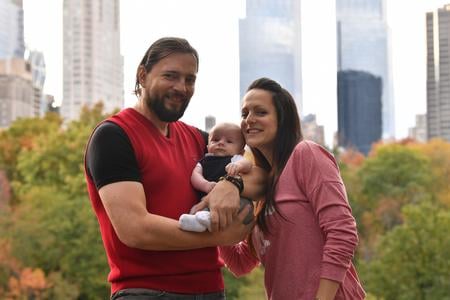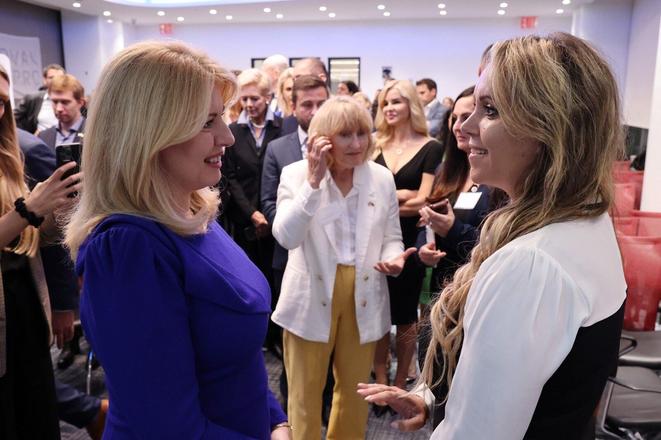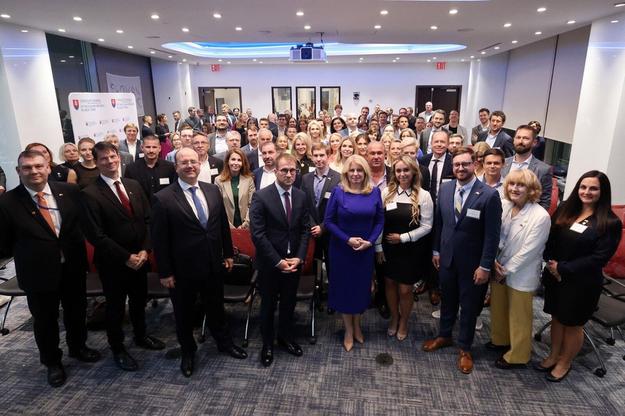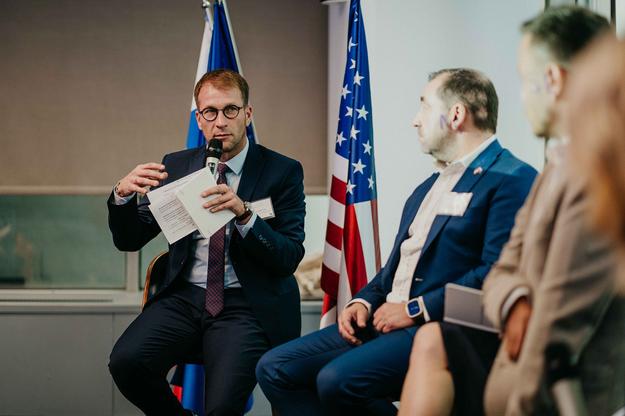She talks about living in New York City, and being involved in the activities of the non-profit organisation Slovak PRO, as coincidences that simply happened in her life.
IBM, for which she worked in Bratislava, sent her to the headquarters of the company located in the Big Apple. She didn't protest.
"It will be about eight years already. They didn't send me back," says Kristína Sojáková.
During one visit to New York City by former president Andrej Kiska, she learned about the non-profit organisation Slovak PRO. She was impressed that Slovaks support each other in the organisation. Today, it is also trying to connect with Slovakia and expand beyond the borders of the Big Apple. In September of this year, the non-profit even put together a summit in cooperation with the Consulate General of the Slovak Republic in New York. It was also attended by President Zuzana Čaputová, former finance minister Ivan Mikloš; but mainly dozens of clever Slovaks working overseas, among them, for example, astronomer Peter Vereš from Harvard University and Martin Viecha, who works with Elon Musk from Tesla, as well as organisations of Slovaks working in the USA such as Živena, Slovak Global Network or Friends of Slovakia.
"It was nice to talk about how much Slovakia needs a bridge with Slovaks abroad," recalls Sojáková.
It does not mean that all Slovaks abroad should now return to Slovakia, she adds. Many could serve as Slovakia's contact points with the world.
Thanks to Slovak, students don't have to starve
In addition, for certain Slovaks, returning to Slovakia is currently impossible. Some have started families, others feel that they would not be able to use the experience gained in the USA anywhere in Slovakia.
"Sometimes they feel that nobody in Slovakia is interested in them," Sojáková notes.
Despite this, many did not resent their homeland. They care about Slovakia, they follow events at home and try to help the country. Many have built wide networks of contacts with various companies in America over the years.
“The question is how to use these networks," adds the Slovak.
At the September summit, for example, Katarína Bridová turned up. She is vice president of the financial company Morgan Stanley. Harvard graduates Martin Hudák from PepsiCo and Martin Hudák from Astatine Investment Partners also came. According to Sojáková, both played basketball in the past.
"They are tall men in high positions," she says.
Peter Gajdoš has lived in the USA for more than 20 years and today invests in climate technologies all over the world. He also supports Slovak secondary school students, including Roma students, in being able to study abroad. Gajdoš himself came to America as a secondary school student.
"When he was in secondary school in the US, he was sometimes hungry because the scholarship did not cover all the costs of living in America," says Sojáková.
According to her, his scholarships are aimed at ensuring that today's Slovak students in the USA do not have to starve.
Americans thank Slovaks
Although even today Americans confuse Slovakia with Slovenia or mention Czechoslovakia, Sojáková says that Americans know that Bratislava is the capital of Slovakia.
"I have the feeling that they have been noticing Slovakia much more often over the years," she thinks.
It's not just the European trips that Americans set out on. During a cycling event far from New York, locals told Sojáková that they were glad that Slovakia was helping Ukrainian refugees.
"There are moments that make us visible abroad. For better or for worse," she says.
Think big, says the honorary consul
And what do Slovaks abroad wish for Slovakia?
Gajdoš would like to see a normal government in power support innovation and Slovaks returning to their homeland. Paul Gabrik, who came to New York City as a child more than 40 years ago, would like to see Slovakia as a mature democracy.
"We have the potential to be a country that others can admire," he told Sojáková after the September summit.
Digital designer Michal Šimkovič from San Francisco wishes Slovaks to be more patient. Other Slovaks abroad mention the unity of society. Katarína Nováková from Blue Horizon International would welcome "more optimism, less negativity in everything". Kristína Čahojová, who founded the company Femtech and lives with her family in San Francisco, wishes for Slovaks not to envy others.
American Barbara Pivnicka, who heads the San Francisco Global Trade Council and acts as Slovakia's honorary consul in California, recommends that Slovakia follow only one mantra.
"I would like a small country in the middle of Europe to think big," she says.

This article was published with the support of a grant from the Ministry of Foreign and European Affairs of the Slovak Republic. The project idea came from Kristína Sojáková, who works for IBM in NYC and co-runs the Slovak Professionals in New York group.



 President Zuzana Čaputová talks to IBM employee Kristína Sojáková in NYC after the political summit. (source: Facebook/Generálny konzulát SR v New Yorku/Paul Martinka and Marcel Melus)
President Zuzana Čaputová talks to IBM employee Kristína Sojáková in NYC after the political summit. (source: Facebook/Generálny konzulát SR v New Yorku/Paul Martinka and Marcel Melus)
 Slovak PRO summit participants of 2023. (source: Facebook/Generálny konzulát SR v New Yorku/Paul Martinka and Marcel Melus)
Slovak PRO summit participants of 2023. (source: Facebook/Generálny konzulát SR v New Yorku/Paul Martinka and Marcel Melus)
 Milan Vrbovský, Slovakia's Consul general in NYC during the Slovak PRO summit in mid-September 2023. (source: Facebook/Generálny konzulát SR v New Yorku/Paul Martinka and Marcel Melus)
Milan Vrbovský, Slovakia's Consul general in NYC during the Slovak PRO summit in mid-September 2023. (source: Facebook/Generálny konzulát SR v New Yorku/Paul Martinka and Marcel Melus)